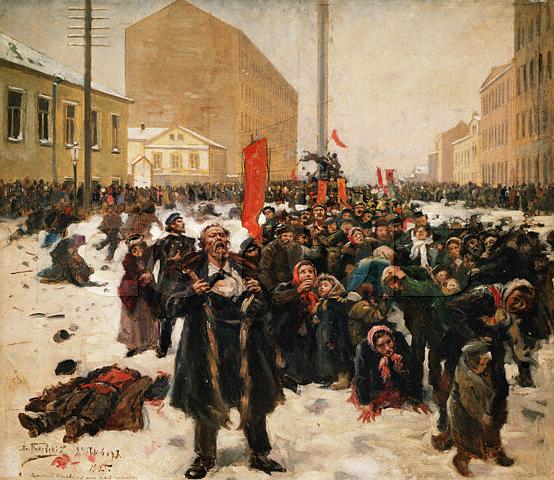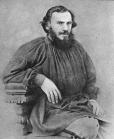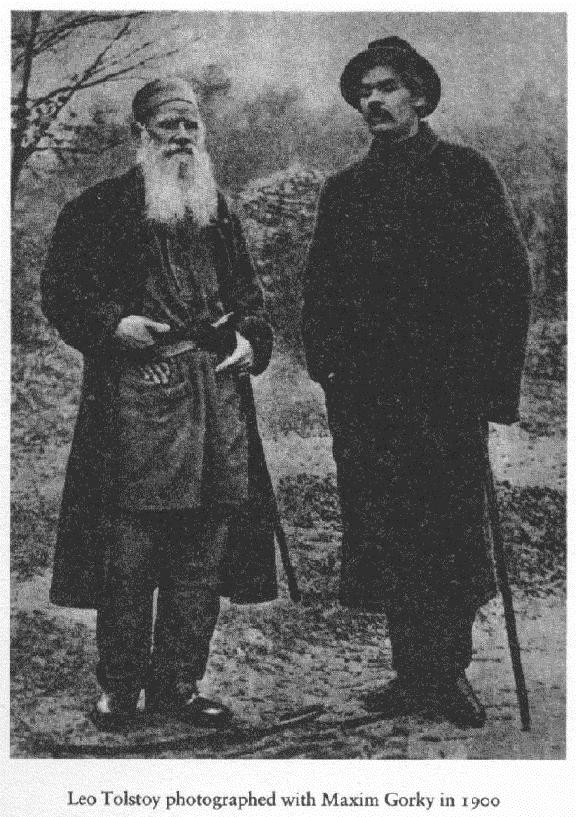 Organ of Alliance Marxist-Leninist (North America)
Volume 1, Issue 9; November-December 2003 $1.00
Organ of Alliance Marxist-Leninist (North America)
Volume 1, Issue 9; November-December 2003 $1.00 



Lev Nicolaevich Tolstoy
(1828-1910 ) was born into the aristocracy with the
title of “Count”, but renouneced its views and habits, and became a fierce
critic of it:
“By birth and education Tolstoy belonged to the highest landed nobility in Russia -- he broke with all the customary views of this environment and in his later works attacked with fierce criticism all the contemporary state, church, social and economic institutions which were based on enslavement of the masses, on their poverty, on the ruin of the peasants and the petty proprietors in general, on the coercion and hypocrisy which permeated all contemporary life from top to bottom.”
V. I. Lenin: L. N. Tolstoy And The Modern Labour Movement”; V. I. Lenin, Moscow, 1967, V 16, pp. 330-32;
or at: http://marx2mao.phpwebhosting.com/Lenin/TMLM10.html
Since
Tolstoy, was closely observing the abuse of the serf-owners, his art was naturally
marked by the struggles against serfdom:
“L. N. Tolstoy emerged as a great artist when serfdom still held sway in the land. . . The epoch of preparation for revolution in one of the countries under the heel of the serf-owners became, thanks to its brilliant illumination by Tolstoy, a step forward in the artistic development of humanity as a whole.”
V.I.Lenin “L. N. Tolstoy”; V. I. Lenin, Moscow, 1967; Vol 16: pp323-27; or at:
http://marx2mao.phpwebhosting.com/Lenin/LNT10.html
His time of writing, meant that Tolstoy’s art reflected the turning point of Russian society, from serf-owning autocracy to capitalism:
“ L. Tolstoy began his literary career when serfdom still existed but at a time when it had already obviously come to the end of its days. Tolstoy's main activity falls in that period of Russian history which lies between two of its turning points, 1861 and 1905. Throughout this period traces of serfdom, direct survivals of it, permeated the whole economic (particularly in the countryside) and political life of the country. And at the same time this was a period of the accelerated growth of capitalism from below and its implantation from above. . . . After 1861 this old patriarchal Russia began rapidly to disintegrate under the influence of world capitalism. The peasants were starving, dying off, being ruined as never before, fleeing to the towns and abandoning the soil. There was a boom in the construction of railways, mills and factories, thanks to the "cheap labour" of the ruined peasants. Big finance capital was developing in Russia together with large-scale commerce and industry.”
“L. N. Tolstoy And The Modern Labour Movement”; Ibid;
This rapid, painful,
drastic demolition of all the old "pillars" of old Russia was reflected in
the works of Tolstoy the artist, and in the views of Tolstoy the thinker.
This made him a mirror of the Russian revolution, but as Lenin put it - an
“artificial” mirror - because Tolstoy did not understand the Revolution. Nevertheless,
as a great artist irrespective of his own views, he did reflect reality:
“To identify the great artist with the revolution which he has obviously failed to understand, and from which he obviously stands aloof, may at first sight seem strange and artificial. A mirror which does not reflect things correctly could hardly be called a mirror. Our revolution, however, is an extremely complicated thing. Among the mass of those who are directly making and participating in it there are many social elements which have also obviously not understood what is taking place and which also stand aloof from the real historical tasks.”
V. I. Lenin: “Leo Tolstoy As The Mirror Of The Russian Revolution;” Moscow, 1963; CW; Vol. 15, pp. 202-209. or at:
http://marx2mao.phpwebhosting.com/Lenin/TMRR08.html
Because he did not understand how to change society, Tolstoy was intensely torn, at his heart was a contradiction. He could see the injustice of life, but could not see how to overcome this except by a complex mixture of religious acts drawn from Christianity, and a constant self-abnegation and self-sacrifice. It was a total rejection of politics.
As put by Lenin:
“The contradictions in Tolstoy's works, views, doctrines, in his school, are indeed glaring. On the one hand, we have the great artist, the genius who has not only drawn incomparable pictures of Russian life but has made first-class contributions to world literature. On the other hand we have the landlord obsessed with Christ. On the one hand, the remarkably powerful, forthright and sincere protest against social falsehood and hypocrisy; and on the other, the "Tolstoyan", i.e., the jaded, hysterical sniveller called the Russian intellectual, who publicly beats his breast and wails: "I am a bad wicked man, but I am practising moral self-perfection; I don't eat meat any more I now eat rice cutlets." On the one hand, merciless criticism of capitalist exploitation, exposure of government outrages, the farcical courts and the state administration, and unmasking of the profound contradictions between the growth of wealth and achievements of civilisation and the growth of poverty, degradation and misery among the working masses. On the other, the crackpot preaching of submission, "resist not evil" with violence. On the one hand, the most sober realism, the tearing away of all and sundry masks; on the other, the preaching of one of the most odious things on earth, namely, religion, the striving to replace officially appointed priests by priests who will serve from moral conviction, i.e., to cultivate the most refined and, therefore, particularly disgusting clericalism. ……”
“Leo Tolstoy As The Mirror Of The Russian Revolution;” Ibid.
Tolstoy overcame these contradictions
because as a great artist, although he could not prescribe a real path to
change, he could vividly express what he saw. And what he did see was the
disintegration of society. Lenin felt that Tolstoy was best viewed as a “spokesman
of” the peasants, and that Tolstoy expressed the “specific features of the
revolution as a peasant bourgeois revolution”:
“ The contradictions in Tolstoy's views and doctrines . . express the contradictory conditions of Russian life in the last third of the nineteenth century. The patriarchal countryside, only recently emancipated from serfdom, was literally given over to the capitalist and the tax-collector to be fleeced and plundered. The ancient foundations of peasant economy and peasant life, foundations that had really held for centuries, were broken up for scrap with extraordinary rapidity. And the contradictions in Tolstoy's views must be appraised not from the standpoint of the present-day working-class movement and present-day socialism (such an appraisal is, of course, needed, but it is not enough), but from the standpoint of protest against advancing capitalism, against the ruining of the masses, who are being dispossessed of their land -- a protest which had to arise from the patriarchal Russian countryside. . . . Tolstoy is great as the spokesman of the ideas and sentiments that emerged among the millions of Russian peasants at the time the bourgeois revolution was approaching in Russia. Tolstoy . . . happens to express the specific features of our revolution as a peasant bourgeois revolution. From this point of view, the contradictions in Tolstoy's views are indeed a mirror of those contradictory conditions in which the peasantry had to play their historical part in our revolution.” “Leo Tolstoy As The Mirror Of The Russian Revolution;” Ibid.
What were these peasant contradictions
that Tolstoy’s works reflects?
“On the one hand, centuries of feudal oppression and decades of accelerated post-Reform pauperisation piled up mountains of hate, resentment, and desperate determination. The striving to sweep away completely the official church, the landlords and the landlord government, to destroy all the old forms and ways of landownership, to clear the land, to replace the police-class state by a community of free and equal small peasants -- this striving the is the keynote of every historical step the peasantry has taken in our revolution; and, undoubtedly, the message of Tolstoy's writings conforms to this peasant striving far more than it does to abstract "Christian Anarchism", as his "system" of views is sometimes appraised. “
“Leo Tolstoy As The Mirror Of The Russian Revolution;” Ibid.
But at the same time, Tolstoy
there was a “semi-religious idea of life”, a misconception of what type of
fight was needed to obtain the new society. Tolstoy’s uptopianism, incorporated
a religious reflex, to which supplication and entreaty was natural. This
derived from the “renunciation of poolitics’, and characteristic of the peasantry:
“On the other hand the peasantry, striving towards new ways of life, had a very crude, patriarchal, semi-religious idea of what kind of life this should be, by what struggle could liberty be won, what leaders it could have in this struggle, what was the attitude of the bourgeoisie and the bourgeois intelligentsia towards the interests of peasant revolution, why the forcible overthrow of tsarist rule was needed in order to abolish landlordism. . . . . . . .
Most of the peasantry wept and prayed, moralised and dreamed, wrote petitions and sent "pleaders" -- quite in the vein of Leo Tolstoy! And, as always happens in such cases, the effect of this Tolstoyan abstention from politics, this Tolstoyan renunciation of politics, this lack of interest in and understanding of politics, was that only a minority followed the lead of the class-conscious revolutionary proletariat, while the majority became the prey of . . . unprincipled, servile, bourgeois intellectuals . . . Tolstoy's ideas are a mirror of the weakness, the short comings of our peasant revolt, a reflection of the flabbiness of the patriarchal countryside and of the hidebound cowardice of the "enterprising muzhik".
V. I. Lenin: “Leo Tolstoy As The Mirror Of The Russian Revolution;” Ibid.
In fact it was because he was such a close and sympathetic observer
of the peasants, that he had “imported their naiveté”
into his philosophy:
“Tolstoy's criticism is marked by such emotional power, such passion, convincingness, freshness, sincerity and fearlessness in striving to "go to the roots", to find the real cause of the afflictions of the masses, just because this criticism really expresses a sharp change in the ideas of millions of peasants, who had only just emerged from feudalism into freedom, and saw that this freedom meant new horrors of ruin, death by starvation, a homeless life among the lower strata of the city population, and so on and so forth. Tolstoy mirrored their sentiments so faithfully that he imported their naïvete into his own doctrine, their alienation from political life, their mysticism, their desire to keep aloof from the world, "non-resistance to evil", their impotent imprecations against capitalism and the "power of money". The protest of millions of peasants and their desperation -- these were combined in Tolstoy's doctrine. “
“Tolstoy And The Modern Labour Movement”; Ibid.